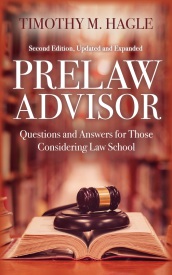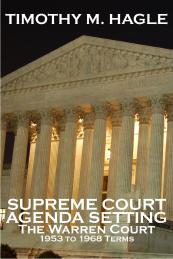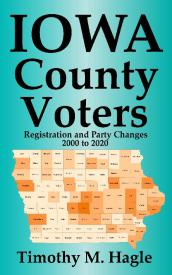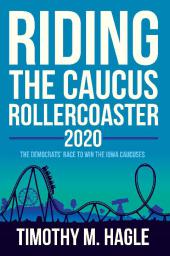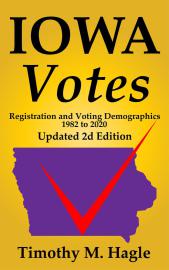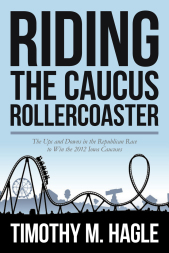
Contact Info
347 Schaeffer Hall
319-335-2348
timothy-hagle@uiowa.edu
Twitter: @ProfHagle
Fall 2024 Office Hours
Tue & Th: 4:45-6:15
Mailing Address
Dept of Political Science
341 Schaeffer Hall
20 E. Washington Street
The University of Iowa
Iowa City, Iowa 52242
News
Posted updated Prelaw FAQ for UI students
New Book, Riding the Caucus Rollercoaster 2024, published in paperback and for Kindle devices.
Posted updates to 12 papers in Iowa Voting Series for 2022 election data
New Book, Supreme Court Agenda Setting: The Warren Court, published for Kindle devices and computers with Kindle reader.
Published updated and expanded edition of Prelaw Advisor in paperback and for Kindle readers
My books
About American Constitutional Law and Politics (POLI:3101/30:116)
This course will most likely be quite different from other courses you have had, including other Political Science courses. The purpose of this handout is to briefly explain the approach of the course.
Most of the people who take this course are interested in (or at least thinking about) law school. Nevertheless, this course can be quite valuable even for those who are not interested in law school and only want to learn something about American Constitutional Law and Politics. This course is not necessary for those planning on law school, but it can be very helpful. In this course you will learn how to read an "opinion" of a court (its formal written decision), how to interpret court opinions (what these opinions mean for the average citizen), and you will also learn a great deal of legal terminology.
The reading load for this course is relatively light in terms of the number of pages, but do not let this fool you into thinking the course will be easy. Court opinions are often very complex. In reading the cases (opinions) you must pay attention to every word. It is not enough that you get the general idea. Here, you must know and understand the specifics of the cases. The Justices of the Supreme Court, as you will see, often make very fine distinctions between cases and you must understand those distinctions to understand the cases. To succeed in this course, you must commit yourself to spending a substantial amount of time preparing for class.
This brings me to explaining what we will do during class time. I prefer to present the material in a question and answer format modeled on what is known as the Socratic Method (which is often used in law schools). Using this format, four to six students sign up to discuss the day's cases. I usually begin by asking a student to tell me the important facts of the first case. Next I might ask the second student whether he or she concurs or thinks there are other important facts. At some point I begin to ask about the issues involved in the case as well as the decision of the court. The material that follows the main cases in the casebook (Cohen and Danelski) usually contains short notes describing other cases or hypotheticals. I will usually work these into the discussion as well. Each day's discussants must be prepared for the discussion to be of value to them or other members of the class.
How, then, does one prepare for class? Two main things need to be done before the class discussion of a case: 1) you must read the case, and 2) you must "brief" the case. In doing the first, I must again emphasize that a quick scan will not be sufficient. You must read the case in detail. This includes looking up unfamiliar words in a law or other dictionary and making notes in the margins about questions you may have. For the second, briefing a case means picking out certain important details from a case: 1) the (important) facts, 2) the issues, 3) the reasoning used by the court, 4) the conclusions reached by the court, and 5) any other relevant material. By briefing a case you are essentially outlining it or taking notes on it. Again, this needs to be done before class.
Why does briefing need to be done before class? In conducting the discussion I assume everyone has read the case and understands the basic issues and arguments of the case. My questions will highlight certain aspects of the cases, and often we will go off on tangents. If you have not read and briefed the cases before the discussion, you will quite likely not get much out of the discussion. A major purpose of the discussion is to show you how to think about the cases. If you are busy trying to take notes based on the questions and answers, you will have difficulty following the disscussion and in seeing how the cases relate to one another. Thus, you should take the bulk of your notes in advance by briefing. (I should mention here that you will obviously not get anything out of the discussions if you do not attend class.)
As I said above, each day several students will be responsible for discussing the day's cases. Nevertheless, I also rely on comments from other students. My only concern is that I ask a sufficient number of questions to the assigned students to be able to evaluate their performance. Even if you do not plan to participate when not assigned discussion duties, you should try to follow the discussion. When a question is asked or a comment is made, think how you would respond. Ask yourself if you agree with the given response.
Another important aspect of the course is the integration of the material. Although each case may be important, it does not stand alone. My questions often concern how the results of a particular case relate to other cases in that area, and in other areas. Do not treat the cases as discrete units. You must try to fit them together into some coherent whole.
A major misconception about the study of The Law is that such a thing exists. For most of the questions we will face in this course there is no one right answer, or at least one that does not contain several qualifiers. This is another reason it will be difficult taking notes during class. During discussion I explore possibilities and hypotheticals. One purpose of these explorations is to help you to understand what the court did say or decide and, more important, what it will say or decide in future cases. A thorough understanding of the Court's past decisions will make you better prepared to evaluate what the Court might (or should) decide in other situations.
